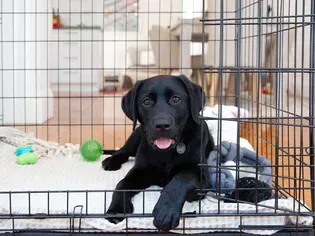How to Housebreak Your Puppy
Updated on 05/27/24

The Ultimate Guide to Housebreaking Your Puppy: A Step-by-Step Journey to a Clean and Odorless Home
Introduction: Embarking on the Potty-Training Adventure
Congratulations on welcoming your adorable puppy into your life! While the joy of puppyhood is undeniable, one of the first and most crucial tasks you'll face is housebreaking. This comprehensive guide will equip you with everything you need to know to effectively potty-train your furry companion, transforming your home into a sanctuary free of unpleasant surprises.
Understanding Your Puppy's Natural Instincts
Before diving into training, it's essential to understand your puppy's natural instincts. Dogs are den animals, which means they possess an innate desire to keep their living spaces clean. This instinct can be leveraged to your advantage during housebreaking.
Establishing a Designated Potty Area
Choose a specific outdoor location as your puppy's designated potty area. Consistency is key, as puppies tend to prefer going in familiar places. Make sure the area is easily accessible, away from distractions, and large enough for your puppy to move around comfortably.
Setting Up a Potty Schedule
Just like human babies, puppies need to eliminate frequently, especially after eating, drinking, and waking up from naps. Establish a regular potty schedule, taking your puppy outside to their designated area approximately every 2-3 hours.
Praise and Rewards: Reinforcing Good Behavior
Positive reinforcement is crucial for successful housebreaking. When your puppy eliminates in the designated area, immediately offer lavish praise, treats, and affection. This positive association will encourage them to repeat the desired behavior.
Avoiding Punishment: A Detrimental Approach
Punishment should never be used as a potty-training method. Scolding, hitting, or rubbing your puppy's nose in their mess will only make them fearful and less likely to eliminate in front of you. Instead, focus on rewarding positive behavior and managing the environment to prevent accidents.
Managing Nighttime Accidents
Puppies have small bladders and may not be able to hold it throughout the night. To minimize nighttime accidents, take your puppy out for a final potty break just before bedtime and consider using a crate. Crates provide a cozy and safe space for puppies, and they instinctively avoid soiling their sleeping area.
Troubleshooting Common Housebreaking Challenges
Regression or Relapse: If your puppy suddenly starts having accidents after being housebroken, there may be an underlying medical condition or a change in routine. Consult with your veterinarian to rule out any health issues and adjust your training accordingly.
Marking Territory: Some male puppies may engage in urine marking, especially if there are other animals in the household. Neutering can help reduce this behavior, but additional training may be necessary to reinforce appropriate elimination spots.
Substrate Preference: Puppies may develop a preference for eliminating on certain surfaces, such as carpet or grass. If your puppy shows a strong preference, it's important to make the designated potty area as similar as possible to their preferred surface.
Preventing Accidents and Cleaning Up
Puppy-Proofing Your Home: Block off areas where your puppy may be tempted to eliminate, such as under furniture or behind curtains. Supervise your puppy closely, especially during the early stages of training.
Cleaning Up Accidents: If an accident does occur, promptly clean up the mess with an enzymatic cleaner specifically designed for pet messes. These cleaners neutralize odors and prevent your puppy from being attracted to the same spot for future eliminations.
Conclusion: A Journey of Patience and Consistency
Housebreaking your puppy requires patience, consistency, and unwavering positive reinforcement. By understanding their natural instincts, establishing routines, and managing challenges, you can transform your home into a clean and odorless environment. Remember to enjoy the journey with your adorable puppy, and don't hesitate to seek professional help if needed. Congratulations on embarking on this rewarding adventure!
Explore More Pets

Basic Training
Puppy and Baby Introductions

Working Dog Breeds
All About Search and Rescue Dogs

Dog Treatments
Puppy Vaginitis: Signs, Causes and Treatment

Dog Adoption
After More Than 1,200 Days in the Shelter, Coco Goes Home

Basic Training
How to Train Your Puppy to Go on Potty Pads

Hybrid Dog Breeds
The Difference Between a Mutt, Mixed Breed, or Designer Dog?

Dog Treatments
Nail Problems in Dogs

Puppies
7 Reasons Why Two Dogs Are Better Than One
